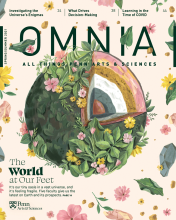Rising to the Challenge
A message from editor Blake Cole
One student is planning to pursue a master’s in public health, citing the global health disparities highlighted during the pandemic. Another serves as treasurer of the historical commission in his town in an effort to ensure young people are represented so they can grow to meet the challenges of a post-pandemic world. We examine five such undergraduates in “Learning in the Time of COVID.” They stand as perfect examples of how the compounding challenges of the past year, whether personal—adjusting to new social dynamics—or societal—grappling with the ongoing effects of institutional inequality—have molded the research and advocacy of the Penn Arts & Sciences community. We hear from the faculty guiding these young minds in “Lessons Learned,” in which professors reflect on the unique strategies they’ve employed to ensure students excel in their online classrooms. And in “Whether Forecasting,” a psychologist studies brain activity to better understand what drives decision-making—research that is especially vital in analyzing human behavior during stressful periods like pandemics.
As we confront the ugly truth of institutional inequality, listening is more important than ever. In “Shifting the Conversation,” the director of the Asian American Studies Program provides insights on anti-Asian racism and community response, and the formation of the Asian American identity as an explicitly political act. We also highlight the new season of the OMNIA podcast, In These Times, which explores the nation’s complex history with race. “Augmented Reality” profiles a new app created by the Penn and Slavery Project that details the University’s historical ties to slavery, while “Writing History” examines how ideas about racial difference took root in American history. And in “The Histories We’re Given,” two Philadelphia statues are contrasted to illustrate how monuments can distort the past.
Also at the forefront of the national and international discussion is humankind’s complex—and often harmful—relationship with our home: Earth. In our cover story, “The World at Our Feet,” five faculty examine our planet from diverse perspectives: how trees can help us understand the planet’s complex history across millennia, and how soil has come to be assigned moral values. Flying high above Earth, “The Night Sky Is the Limit” (p. 24) looks at how big data is transforming not only the study of the universe, but much of academia. In other faculty research stories, we detail everything from how digital media consumption is evolving to underwater surveys that map ancient travel to the interconnections between humans and machines in the future of work.
Though students have needed to adapt to unique learning scenarios, many of them have taken the opportunity to tackle new interests, citing the pandemic as having been vital to their current educational identity. Student research is as innovative as it’s ever been, from a magician using his research background to amaze the audiences at his shows to a doctoral candidate in cultural anthropology using photography and art to explore the human experience.
We hope you enjoy exploring these and other stories that highlight Penn Arts & Sciences’ intellectual investigations and advocacy for equality. Keep safe.



